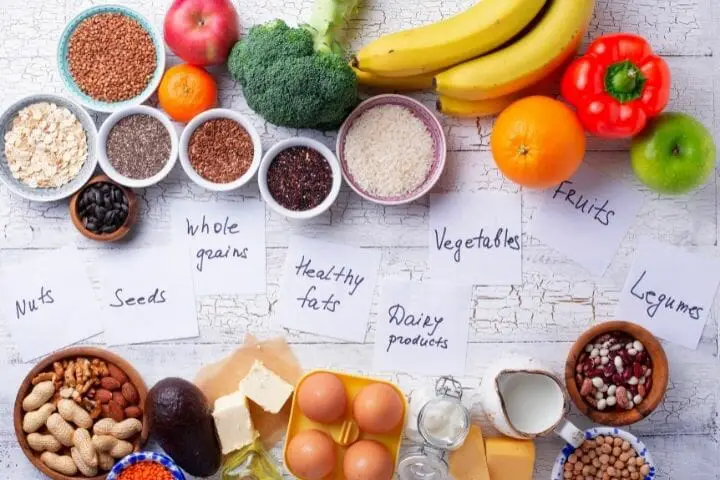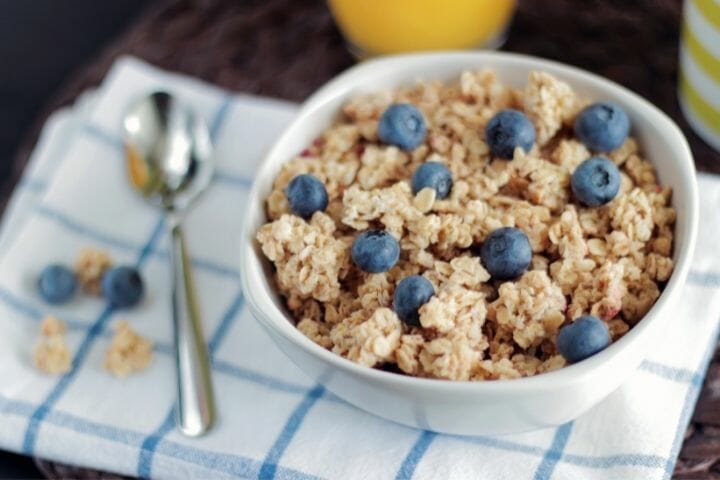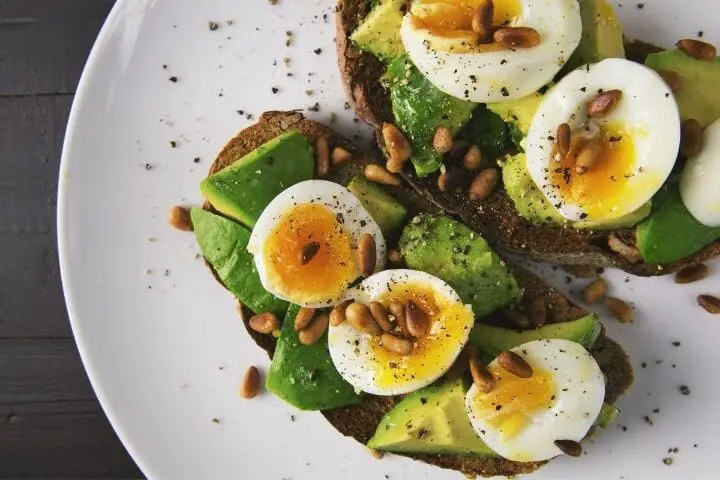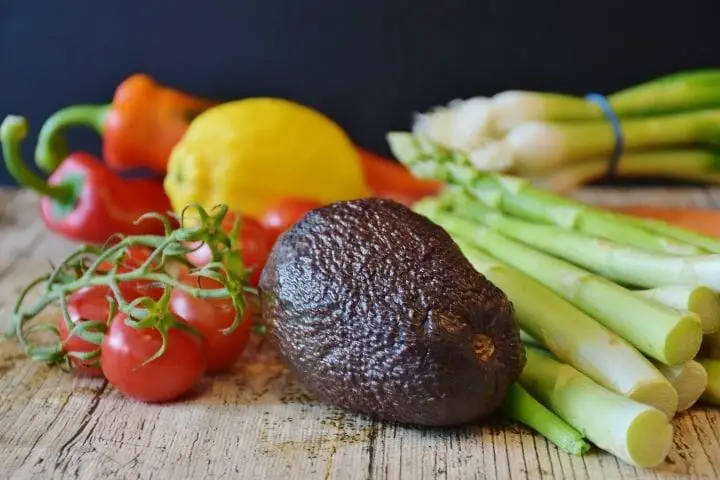Is it possible to eat healthy on a budget? What are the tips and tricks that will help you buy things like fruits and vegetables for cheap? Answers to that and more coming up!
Contents
Eating healthy is an essential aspect of life if you want to remain fit and active for a long time. But people who live on a strict budget often have this misconception that they can only eat healthy if they have enough money. About 26% of the American population earns less than $35,000 a year, and having a nutritious meal is a major challenge for them.

Contrary to popular belief, eating healthy on a tight budget is possible. Just because you are sticking to your budget does not mean that you will not have nutritious food options. In this article, we will try to prepare a healthy diet plan that is not very expensive.
16 Tips For Eating Healthy On A Budget
It can be challenging to eat on a budget, especially if you have expensive living conditions such as an ailment or disease like diabetes, heart problem, and so on. Eating healthy is the key to maintaining healthy blood sugar levels. Ideally, your diet should be rich in fruits, vegetables, and lean protein.
Some of the tips which will surely help you to have a nutritious diet while sticking to your budget are mentioned here:-
#1 Decide and plan your meals
If you wish to save some money on the ingredients while shopping, the best thing to do is plan your meals. You can go different ways about it. One way is to sit one day in a week and plan all the meals you’ll be having for the coming week.
It is essential that before you go out shopping for the ingredients, you also check your inventory, whether it is scanning your refrigerator or searching the racks and the cabinets. This will allow you to know what all ingredients you will need to buy for the week.
Or you can also plan your meals daily, where you sit down every morning and plan what you are going to eat that day.
Sometimes you can find ingredients on the list, but you were not aware of them being there in your home. It is also an excellent tip to identify the foods or the ingredients that are about to expire. So that you can plan your meals around such ingredients and they do not go to waste.
Try only to buy quantities of ingredients that will be useful to you. This will enable you to save a lot of money on ingredients that you may not need in the future.

#2 Try to stick to your ingredients list
Shopping grocery can be very tempting, especially when you see huge aisles of tasty and expensive food. But if you are determined enough to have a healthy diet and not exceed your budget, then you should stick to your grocery shopping list.
There are high chances that you can be distracted and end up buying something aside from your list resulting in unexpected expenses (known as impulse buying).
Generally, you should start shopping from your list from the edges of the store as you’ll find most of the whole foods and essential items along the edges. You should buy the essentials first, then go for other things.
The store’s middle aisles are usually filled with processed food or expensive stuff. Avoid going into these areas if you don’t have anything on your list from these aisles.
If you find yourself in this aisle, try and look for your items on the top and the bottom shelves. Do not look for the items on the middle shelves, as stores place all expensive items as close to your eye level as possible. If you are elderly and cannot write and maintain a shopping list, you can also go for certain grocery list apps available on the internet.
These apps are easy to maintain and can also be shared between shoppers. Using such a list will eliminate the risk of forgetting your grocery list at home.

#3 Eat homemade food
Eating food cooked at home is far more nutritious and cheaper than dining out. You can feed at least four people by cooking at home with the same amount of money that you spend to order food from outside for one or two people. Don’t dine out or order food from outside if you wish to maintain your budget.
You can make it your habit to cook your food yourself. At first, you might struggle to get used to cooking by yourself. But it is the simplest way by which you can remain in control of your budget.
Different people have different approaches to this as well. Some people prepare their meals for the entire week on weekends whereas other people might prepare their meals daily.
A major understated advantage of cooking for yourself is that while you cook for yourself, you control the entire dish. So you know exactly how much of these ingredients and what quantity of these ingredients are used in the dish.
#4 Try to cook larger portions and use your leftovers
Cooking larger meals is an excellent strategy, especially if you are a working individual. Cooking larger meals will save a lot of time and money. You can also use the leftover food again for your lunch or other meals. You can also reuse the leftover food in a stew, salads, burritos, and so on.
When an individual operates on a strict budget, having leftovers can prevent you from spending extra money on preparing other meals. They are helpful when you don’t have enough time to cook a meal. You can even freeze the leftovers for later consumption.

#5 Avoid shopping when hungry
Going grocery shopping, especially when you are hungry, can be very expensive. In such a condition, you are very likely to abandon your shopping list and go for something that you want to consume at that time.
Hunger may also result in impulse buying. Eating ready-made or processed food is also not suitable for your healthy diet as they don’t always have the best health benefits.
Instead of eating processed foods, you should go for whole foods as they are much healthier. On top of this, processed foods are also considerably more expensive than regular foods. Buying such food will also exceed your budget. The best option is to quench your hunger before going shopping. You should eat something at home before you go out to buy stuff.
#6 Focus on whole foods
Whole foods are way healthier and cheaper than processed foods. You will also find some food items to be cheaper in their raw form, such as a raw block of cheese is more affordable than shredded cheese. You can shred the cheese as per your requirement at your home if you buy the cheese block. Similarly, canned beans are cheaper than fried beans.
Processed foods are expensive as they go through more stages of production in comparison to raw food. This extra processing costs the people more. Some other cheaper alternatives are whole grains such as brown rice and oats.
You will find these grains to be less expensive per serving than processed and flavored cereals. In most cases, the less processed food you eat, the more nutrients you gain. Raw or less processed food is also sold in larger quantities saving you some extra money.

#7 Go for generic brands
Almost all big box retail stores offer all kinds of brands that include some low, generic, and premium brands. For maintaining your budget, you must focus on generic brands rather than premiums.
The food is more or less the same as all these brands have to follow specific food safety and standard guidelines without which they cannot produce anything. Mostly you can find some generic brands that have a similar quality to national and international brands but are less expensive.
You can ensure the product quality and health quotient by reading about the ingredients and other facts on the packaging. With this information, you can ensure that you are not getting any fewer quality products than the national brands. You can also figure out whether the product contains an allergen or some unexpected ingredients.
#8 Don’t buy ultra processed food
If you compare raw food prices to highly processed food, you will be shocked to see the difference in their prices. Another reason why you should not consider buying them is that they are not very nutritious. Food items like sodas, crackers, cookies, packaged meat, and so on are all examples of highly processed food.
Some of these items have unhealthy sodium, salt, sugar, and other things. If you avoid or skip such food items, you will have more budget to spare on the necessary items. You can consume more whole food items which are more nutritious with this extra money.
#9 Try to shop during sales
Sales are an excellent medium for you to stock up on inventory while making extra savings. You should stock up on products or food items you frequently consume during such sales. If you know you will use a specific item in the future, you can buy more quantities of it.
Buying excess quantities will save you a little extra money for you during these sales. You must make sure that the items you purchase do not expire anytime soon. If the item expires, then you’ll have to throw that out, resulting in a wastage of money instead of saving it.

#10 Buy cheaper meat cuts
If you regularly consume meat in your diet, you can save some extra money by purchasing cheaper meat cuts. Meat fresh from farms and fish can be expensive, especially on a strict budget.
There are several other meat cuts available in the market, and they will cost you much less. You can even get a larger quantity of meat for the same price as fresh meat. Some less expensive meat cuts are pork top, steak, chuck steak, whole chicken, ground meat, and poultry. You can use these meat cuts in dishes like soups, burritos, stews, stir-fries, and so on.
You can buy a larger inexpensive cut of meat that is useful in several other meals throughout the week.
#11 Try to replace meat with other protein sources
If you are on a stringent budget, it is ideal for reducing your meat consumption as it can be more expensive than other protein-rich foods. You can get the protein quotient you require from alternate and cheaper sources such as legumes, eggs, hemp seeds, or canned fish.
You can switch between the protein mentioned above sources and meat, creating a balanced eating plan for the week. If you don’t get much time to prepare your meals or are less proficient in cooking, then these ingredients are also easy to cook. They even have a longer shelf life than meat.
#12 Shop for seasonal produce
Produce that is seasonal can be a good option for you. Local produce that is in season is generally cheaper than out-of-season produce. Another reason to go for seasonal produce is that it will be fresh and high in nutrients.
Produce that is not in a season mainly contains added preservatives and chemicals. These chemicals can reduce their nutritional quotient from them. This product is transported from far-away farms to local stores near you.
If you can buy products available in bags, you should also consider it. This type of product is cheaper than buying produce loosely. Another good reason to incorporate seasonal produce in your diet is that if you have some extra, you can also freeze it for later use and consumption. You can even consider using it for your next week’s meal plans.

#13 Buy frozen fruits and vegetables
Fresh fruits and vegetables are way more expensive than frozen ones because they are only available for a few weeks throughout the year. But if you consider consuming frozen fruits and vegetables, then you’ll get almost similar health benefits at a much cheaper rate.
Frozen fruits and vegetables are available all year round and are usually sold in large bags. You can preserve these fruits and vegetables for longer than fresh fruits and vegetables. It is a good option for a working person who lives alone to go for frozen items.
Frozen produce is excellent for cooking smoothies, cereal, oatmeal, and yogurt. The best thing about frozen items is that you can use them when you need them. You can keep them in the refrigerator for future usage the rest of the time.
#14 Try to buy in large quantities
Buying food items in large quantities or bulk can allow you to save some extra money when operating on a small budget. You can usually buy grains in bulk. Grains such as wheat, rice, brown rice, barley, oats, and millet all fall under whole foods.
If you keep such grains in air-tight containers, they will remain fresh for a longer time. You can also purchase staple foods such as beans, lentils, dried nuts, and dry fruits. Staple foods are comparatively less expensive and can be a healthier addition to various nutritious meals.
#15 You can even grow your produce
If you are a retired person, you also have the luxury to try and grow your produce. Growing your produce will also serve as a good hobby for you while it is also a cheaper way to get cheaper and fresh produce.
If you don’t have enough space to have your garden, you can also join a community garden. There are over 2000 community gardens across America and Canada. You can start with the cheaper seeds, although growing your products will require you to put in some time and effort.
But after some time, you will be proficient in growing your herbs, sprouts, tomatoes, and other crops. You will also find a significant gulf between the taste of homegrown produce in comparison to store-bought produce. If you can ensure a continuous supply of produce to your home, then you’ll be able to save a lot of money in the longer run.

#16 Pack your lunch
Eating food prepared by yourself will be much healthier than eating outside. If you are a working individual, eating out daily can exceed your budget. If you carefully plan and pack your lunch every day, you’ll be able to save some money.
Creating and packing your lunch and meal will keep you in control of the ingredients you are putting in your body. Once you are used to cooking large meals, you’ll be easily able to manage packing a lunch for yourself daily without spending much time and effort. This will require you to have some proper planning and will aid you to save quite a lot of money in the long run.
Final Words
Many people think that it is impossible to have a healthy and nutritious meal without spending loads of money. But this is not true at all.
As discussed in the above content, there are plenty of ways and tips that you can follow to have a healthy diet without exceeding your budget. Most of these tips are simple to execute and follow. Now you don’t need to burn a hole in your pocket or rob a bank to eat healthily!
We hope you liked some of these ideas, and we would love to hear how you implement them in your own budget-based diets. If you feel we missed out on adding some tips and tricks, please put them in the comments for us and our readers.
If you liked the content, please do not forget to post it on your social media profile!
